Your car will not start when it has a dead battery, and you’ll simply have a hard time starting it if with a malfunctioning battery. There are various factors detrimental to the performance and life of car batteries. One is extreme heat, which can damage the internal structure of the battery should the battery fluid evaporates.
Another reason is overcharging. In addition, cold weather or temperatures can increase the viscosity of the engine oil. When this happens, the engine will be harder to turn over - which results in greater stress on the battery.
Do not add too many accessories to your vehicle as they will drain your battery quicker - particularly if you keep them on while the engine is off. A car battery should last you anywhere from 60 to 84 months.
If it is already nearing the end of its life, better to have it replaced rather than risk having it conk out on you in the middle of nowhere. And remember to pick one with the same rating. Here are five important tips to keep your battery in tip-top shape from Philkotse.com.
Battery Care and Maintenance Tips
I. Tips to care for your battery
1. Keep battery terminals clean
You might think that it’s natural and totally fine for your battery terminal to be corroded. Well, it’s not! While there are lots of factors why car batteries get corroded, including exposure to the salt present in the air from sea or ocean, repeated jumpstarting or hard use, and naturally vented gases by some types of batteries, corrosion damages the strong connection between the battery and your cable.
To avoid this, always keep the terminals clean. If ever there is the presence of corrosion, you can use a wire brush to remove it completely. You can also use a post cleaner or baking soda.
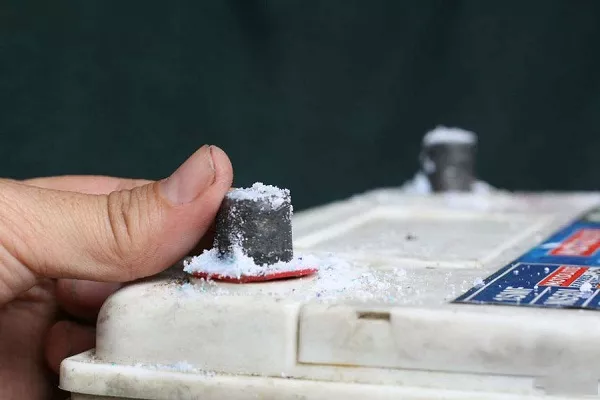
To avoid corrosion buildup, always keep the terminals clean
>>> Worth to note: The Best Method on How to Clean Car Battery Terminals.
2. Inspect the electrolyte levels
If the car battery needs water, it's preferable to use clean, distilled water. Add water to the battery but be careful you don’t overfill the cells. Carefully remove the covers of the battery cells. The acid mixture and water in the battery, known as the electrolyte, should be at the right levels, about ½ inches deep.
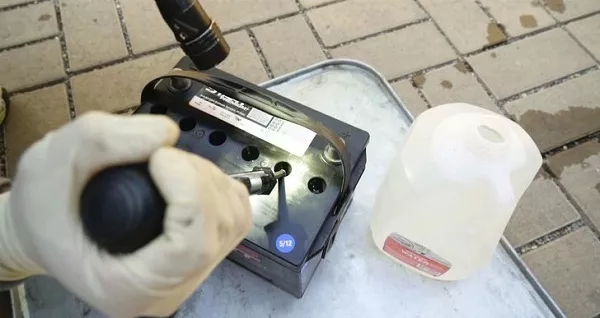
If the car battery needs water, it's preferable to use clean and distilled water
3. Check battery voltage
Check if the car battery is having trouble charging, staying charged, or is not charging like before. It could be a sign that it’s already dying on you. It can also be a sign of a problem with the alternator, and you need to fix it immediately before it can damage the battery.
Inspect the voltage needle of your car and take note if there is any unusual behavior. If your car doesn't have that particular gauge, consider using a multimeter every month to check the battery's charging voltage at the terminals.
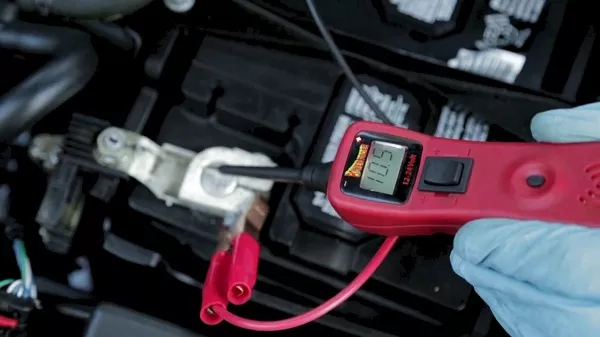
Check if the car battery is having trouble charging
>>> Related: Disconnecting a car battery: The Whys and Hows
4. Look for warning signs of an imminent end
There are many ways to spot a damaged battery. If you notice cracks, leaks, or deformation in the case of the battery, they’re signs that you need to replace it. It’s hard to spot a damaged car battery if it’s dirty.
So, give it a good cleaning - especially its terminals. In the worst-case scenario, damaged batteries can leak or build up hydrogen gas (it’s a byproduct of the chemical reaction inside). If this hydrogen is exposed to a spark when jumpstarting, charging and even turning the ignition on, the battery can explode and hurt someone.
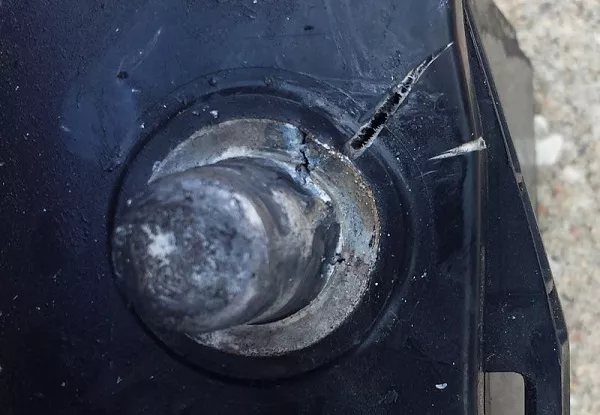
If you notice any cracks, leaks, or deformation in the case of the battery, it is a sign that you need to replace it
>>> Read more: 3 essential things to know about car battery
5. Properly store batteries
Part of proper car battery maintenance is proper storage. If the battery is outside your car, it should be properly stored in a place or room that is well-ventilated and is at room temperature. You should also make sure that the gases expelled from the battery have no chance of building up in an enclosed area.
It is also recommended to leave the car battery on trickle charge. You can use a smart charger to do this. For a long period of storage and cold temperatures, it is advisable to keep your battery fully charged.
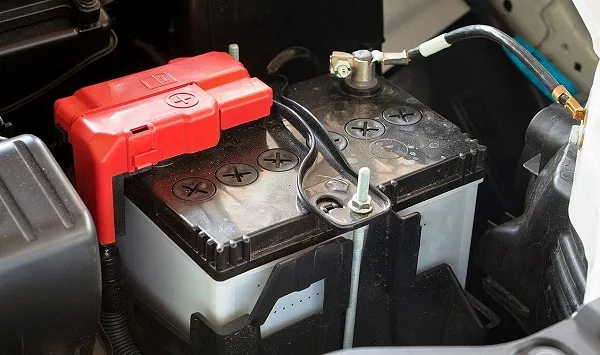
Part of proper car battery maintenance is proper storing
>>> Related: Car battery drain overnight: 5 Possible causes and How to fix it
II.Telltale signs of a failing battery
You can easily tell if your car’s battery is starting to fail or is losing charge. Here are the signs:
- The car’s headlights and interior lights look dim when idle then brighten when the engine is revved.
- The “check engine” or battery light illuminates.
- The starter turns slowly that it barely starts the car. However, this might also signal problems with the alternator wiring which prevent it from fully charging. If this is the case, it’s best to contact your mechanic or schedule a service appointment. Also, check the fan belt. If it is frayed, loose, glazed, or cracked, have it repaired or replaced.
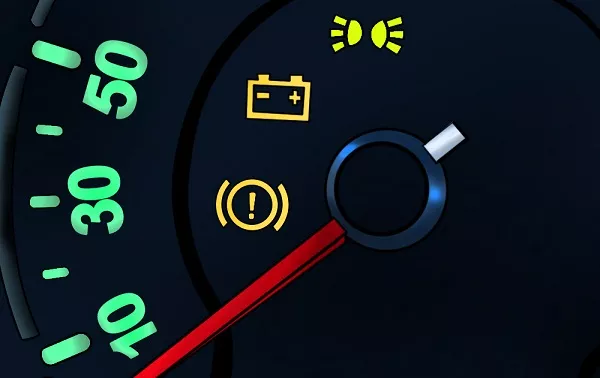
Be careful! Your car battery light is on
>>> Related: Car battery in the Philippines: How long it lasts, what are the different types, and what to buy
III. Importance of car battery care
Battery maintenance is one of the easiest types of car-care chores that you can do on your own. You might already encounter modern car battery models that say “maintenance-free.”
This does not mean that you don't have to check your battery every now and then. It only means that these batteries don’t need to be filled with water, unlike older battery types.
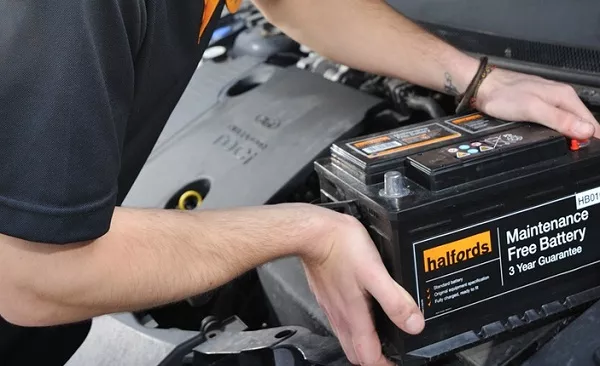
You can regularly check your car battery status by yourself
Car batteries are an important part of every vehicle because, without it, the car will not start. Aside from that, the batteries are also responsible for providing electricity to the vehicle’s accessories. The lights, infotainment system, and air-conditioning system depend on the battery.
A failing battery can cause a lot of hassle especially when you’re stranded in the middle of the road. Aside from that, a neglected battery might injury in case of battery explosions due to leaked hydrogen gas.
>>>Click here to get more helpful tips and advice for your car maintenance.
Recent posts
- Will a dead and dying battery destroy your cars’ alternator? Mar 11, 2021
- A driver's guide in choosing the right battery brand in the Philippines Mar 10, 2022
- 6 steps to safely replace your car battery Jun 21, 2018
- 3 essential things to know about car battery Oct 19, 2020
- What if the battery warning light is on? Oct 23, 2020












